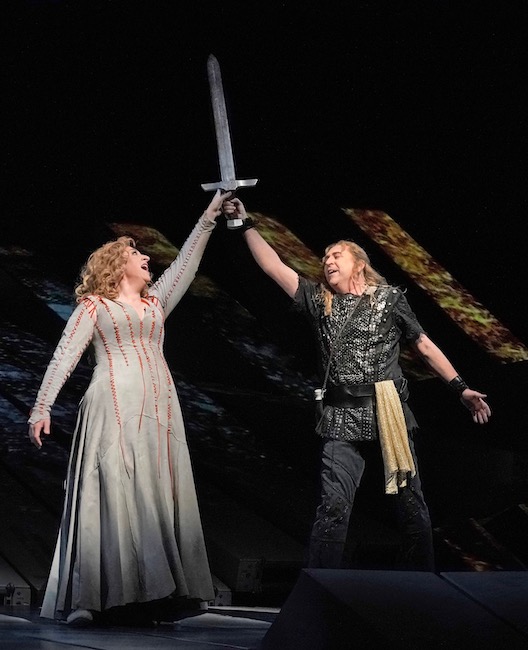Goerke, Jordan illuminate the twilight in Met’s “Götterdämmerung”

Christine Goerke as Brünnhilde and Andreas Schager as Siegfried in Wagner’s “Götterdämmerung” at the Metropolitan Opera. Photo: Ken Howard
It’s fitting that Wagner’s epic Ring cycle, a nearly nineteen-hour experience taken all together, should have an unforgettable ending. After so much time spent with Wagner’s music, the spectacular conclusion of Götterdämmerung is overwhelming, combining climactic size with emotional force.
This is especially so in a performance led with as much skill and imagination as Philippe Jordan brought to Saturday’s matinee at the Metropolitan Opera, the first of four showings in this year’s set of Ring cycles. Jordan has progressed since the opening of Das Rheingold back at the beginning of March. Whereas his reading of the cycle’s first leg didn’t quite capture the scale and richness of the score, Götterdämmerung under his direction was majestic, boasting lush textures, evocative gestures, and a real sense of dramatic scope.
Nowhere was this more apparent than in the opera’s closing scenes, where precise balance and clear intention brought out the emotional power of the music, as the motifs that have driven the many preceding hours of music—the gurgling of the Rhine, the love theme, Valhalla, Loge’s fire—all converged in a breathtaking conclusion. Jordan blended these ideas masterfully, weaving them in and out of each other, and the Met orchestra has rarely sounded better, playing in perfect ensemble and glowing in the pit.
For Christine Goerke, this matinee marked the completion of a remarkable tour as the valkyrie Brünnhilde, her first at the Met. She, too, capped a brilliant performance with a striking last impression, bringing a riveting mix of passions to her immolation scene. She had all the vocal fire required for her final, blazing act of defiance, and indeed her voice thrilled as she threw herself onto the pyre and brought down the kingdom of the gods with her.
But just as impressive is her ability to grasp the quietness of such a complex role, and to hear those two sides in such close tension one more time was stunning. By the end of the Ring, no one has come so far or endured so much as Brünnhilde, suffering betrayal, earning triumphs, experiencing love both filial and romantic. To watch Goerke give such an invested performance throughout the cycle has been a privilege.
Alas, Robert Lepage’s production cannot support the weight of the Ring’s cataclysmic ending. This Götterdämmerung in a sense reflects both the potential and the greatest weaknesses of the Met’s cycle as a whole. The Prologue, in which the segments of Lepage’s machine-set flail violently, destroying the rope of fate as the Norns look on in helpless terror, is among the best demonstrations of this staging’s capacity for powerful spectacle. Yet the final moments, so vivid in the score, are presented as an insipid montage, emblematic of Lepage’s consistently superficial engagement with this complex piece.
The staging gives little for actors to work with, placing all emphasis on the machine behind them and forcing them to entertain themselves in empty space. No one suffered from this more than Andreas Schager as Siegfried, who filled a lot of stage time with bizarre antics such as fixing his hair and cleaning his teeth in the reflection of his sword. His mugging marred an otherwise commendable house debut, in which he showed power in his tenor and bright ring in his top, even if much of his range lacked color.
This cycle has been quite the introduction for Tomasz Konieczny, who made his debut in March’s Das Rheingold and immediately impressed with his dark, powerful bass-baritone. His take on Alberich, the Nibelung who set the plot’s events in motion, is marvelous, dripping with barely repressed fury. His intense commitment to the arc of his character—from a brief moment of intoxicating power as master of the ring to a spiteful, diminished villain with nothing left but his own resentment—made him one of the stars of this cycle.
More subtle was Eric Owens’s portrayal of Hagen, Alberich’s son, whose motives are similar but burn more quietly, letting him stew in his hatred rather than bursting out into the open. This was a welcome return to form for a gifted singer: Owens struggled for a few years, and it was encouraging to hear him sound more focused and more rich than he has in quite some time, bringing back the gravelly, colorful tone that first made him a star.
Evgeny Nikitin brought a robust, surprisingly bright baritone to the role of Gunther, while Edith Haller showed formidable vocal weight and volume as Gutrune, though her voice grew a little unwieldy towards its top. Michaela Schuster sounded too weary to convey the martial vigor of Brünnhilde’s valkyrie sister Waltraute, and Ronnita Miller stood out as the first Norn for the burning intensity of her mezzo-soprano.
Götterdämmerung runs through May 11 at the Metropolitan Opera. Stefan Vinke sings the role of Siegfried in the final performance. metopera.org


